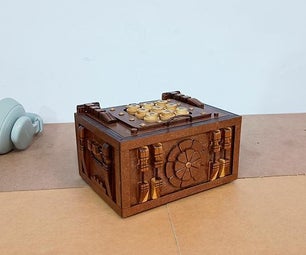Introduction: Travel Practice Guitar (with Video)
This is a very simple nylon string guitar for practicing when you need a minimal-size, quiet guitar, like in a hotel room etc. It's made by chopping up a cheap guitar, so the scale length, neck width, etc. is the same as the original guitar, only it is very quiet because the resonance box of the guitar is gone.
Cost is just the cost of the cheapest guitar you can get (as long as the neck is playable), some thin plywood, and a little extra hardware, like screws, wood glue, etc. I made this in about a week of working a little each evening. Most of the time was waiting for glue to dry, so if you make it without glue, it could be faster.
Step 1: Get a Cheap Guitar
I got this terrible Chinese guitar online for about $40. If I did it again, I'd get a little better guitar, since this one was pretty much unplayable and I had to do some work on the fretboard that should have been unnecessary.
Step 2: Cut the Back Off the Guitar
Cut along the sides and across the back.
Make sure to leave enough guitar at this point that the front of the soundboard is still in the same place compared to the neck. This way, you won't have to worry about the placement of the bridge later on.
Step 3: Remove the Bracing From the Front of the Guitar
I used a chisel and was able to just snap the braces off. You want the back of the soundboard to be flat so you can glue on a board in the next step.
Step 4: Cut Off the Head
Cut off the headstock of the guitar. Leave enough neck at the end of the fretboard for the nut, but you don't need any more than that.
Step 5: Attach a Board to the Back of the Soundboard and Cut Down the Heel
Cut a piece of plywood in the shape that the final guitar body will be, and attach it to the back of the soundboard (with wood glue). The board should extend from the neck (the "Spanish foot" inside the guitar) to at least past the bridge to the butt end. The rest of the soundboard will be cut away later.
Also, now that the front has a little more stability, cut down the heel to the thickness you eventually want the guitar to be. It should be thick enough to have some strength, but as small as possible.
Step 6: Make and Attach a Triangular Board Perpendicular to the First
Cut a triangle of plywood the same length as the first board, and tapering from the thickest part of the guitar (the heel) to a point at the bridge. Attach it along the two edges, to the "Spanish foot" and to the first board. I used wood glue and weighted it with heavy books as per the picture.
Step 7: Attach a Third Board
Cut and attach another board about as long as the first, and attach it to the top of the triangular one, to create a kind of box or I-beam like structure. Make sure to screw this board into the heel of the guitar, and attach firmly at the bridge end.
This is the "body" of the guitar, and should have stability in all three dimensions.
Step 8: Cut the Soundboard Around the First Board
Cut out the body of your guitar from the rest of the soundboard. Cut away as much as possible of the soundboard to make it as small as possible.
Step 9: Reattach the Bridge If Necessary
This guitar's bridge was bolt-on, so bolt it back on now and cut off the "wings". If yours has a glue-on bridge, you will have already cut the wings off in the last step.
Step 10: Cut Down and Shape Headstock
Cut excess wood off the headstock (this is just to make it smaller/lighter), and cut an angle as shown in the picture. This will allow the strings to go directly onto the tuning machines.
Step 11: Attach the Headstock to the Back of the Guitar
Sand the finish off the back of the headstock and attach it to the back of the guitar as shown. The tuners will be at the bottom of the guitar, behind the bridge.
Step 12: Attach Hardware to Tie Strings at the "head" of the Guitar
I used picture-hanging hooks screwed into the end of the neck. Anything strong enough to hold the strings here would work fine.
Step 13: Attach Metal Rollers at the Butt of the Guitar
The strings will need to move smoothly around the tight corner at the bottom of the guitar. Some smooth metal rings with a large enough diameter work.
Some kind of rollers would work well here if you can find some good ones.
Step 14: Reattach the Tuners
Now you can string up the guitar!
Step 15: Attach Straps
I found that a strap around the neck plus a kind of belt strapped tight around the body are needed to keep the guitar stable while playing.
Step 16: Finished! (paint, Decorate, Etc. As You Like)
Enjoy playing!
This fits in my suitcase as pictured. Mine doesn't look very nice, but it's a start. You could decorate, etc as you like.
Be sure to post comments, suggestions, etc. below.











